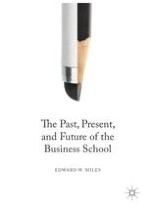2016 | OriginalPaper | Chapter
13. Lessons from University-Based Journalism Schools and Law Schools
Author : Edward W. Miles
Published in: The Past, Present, and Future of the Business School
Publisher: Springer International Publishing
Activate our intelligent search to find suitable subject content or patents.
Select sections of text to find matching patents with Artificial Intelligence. powered by
Select sections of text to find additional relevant content using AI-assisted search. powered by
